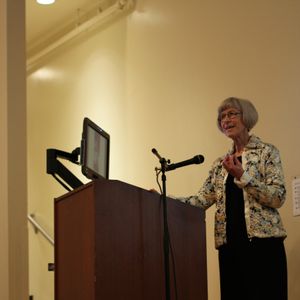Rosalind Williams Delivers Stanley P. Stone Distinguished Lecture

Can literature and stories help us to understand the human domination of the planet? On October 19, Rosalind Williams—Bern Dibner professor of the history of science and technology—delivered this year’s lecture in the Stanley P. Stone Distinguished Lecture Series. Her interdisciplinary lecture—Approaching the End of the World: Geological Age or Historical Epoch?—touched on history, geology, and how the literature of nineteenth-century romantics can help us to understand our own feelings of environmental doom.
Williams traced the “triumph of human empire” (a phrase borrowed from Francis Bacon) during the nineteenth century, when the furthest reaches of the world were being settled and explored. Maps from the time show “the closing of the frontier” and an “acceleration of human presence” across the world, Williams said.
Focusing on writers who were aware of these events and worried by them, Williams introduced the audience to Jules Verne, Robert Louis Stevenson, and William Morris. All white males from central Europe, we might expect that they would only benefit from this new age of exploration—but instead, Williams, said, “They are very troubled by their sense of the closure of civilization in on itself.”

Verne’s romantic hero, Captain Nemo, declares, “I am not what you call a civilized man,” and retreats to the underwater because it is still unexplored and uncivilized. Verne’s stories focus on journeys, quests, and expeditions of uncharted territory.
“The more the human empire oppresses the individual and constrains the individual, the more humans need stories about finding identity, about rebelling,” said Williams.
As industry and factories spread, these writers worried about what would be lost. “Their belief in progress endures but is increasingly in conflict with their vision of history as a rolling apocalypse,” said Williams. “All of them are mourning what they see as an inevitable loss and they all have the feeling that what they most treasure in the world is doomed. They are not going to win. They are true romantics and they’re also true realists.”
This contradiction has become even more acute in our own time, said Williams, “where excitement about the latest software app coincides with a sense of environmental doom.” She summed up: This “deeply conflicted, inward experience of history” is the defining condition of human empire.
The Stanley P. Stone Distinguished Lecture Series brings notable, inspiring speakers to the College of General Studies, inviting the CGS and BU community to broaden their educational experience related to one of the College’s academic division areas: humanities, social science, natural sciences, or rhetoric. Lecture topic areas span the genres, from environmental change and violent conflict to the biology of viruses and public health; from racism in the U.S. to musical theatre and the American urban experience; from the evolution of goodness to American foreign policy. Instituted in 1989, the College is grateful to offer this enriching experience on an annual basis, made possible by the generosity of Stanley P. Stone (CGS’64, Questrom’66).